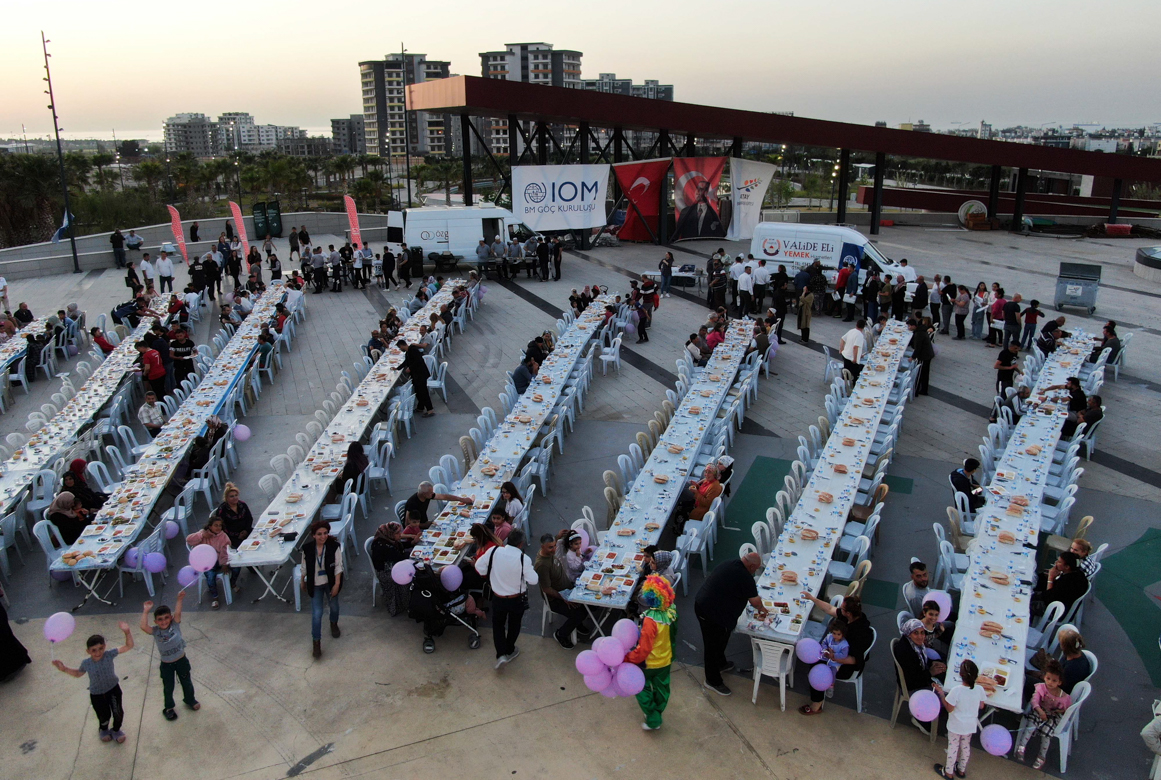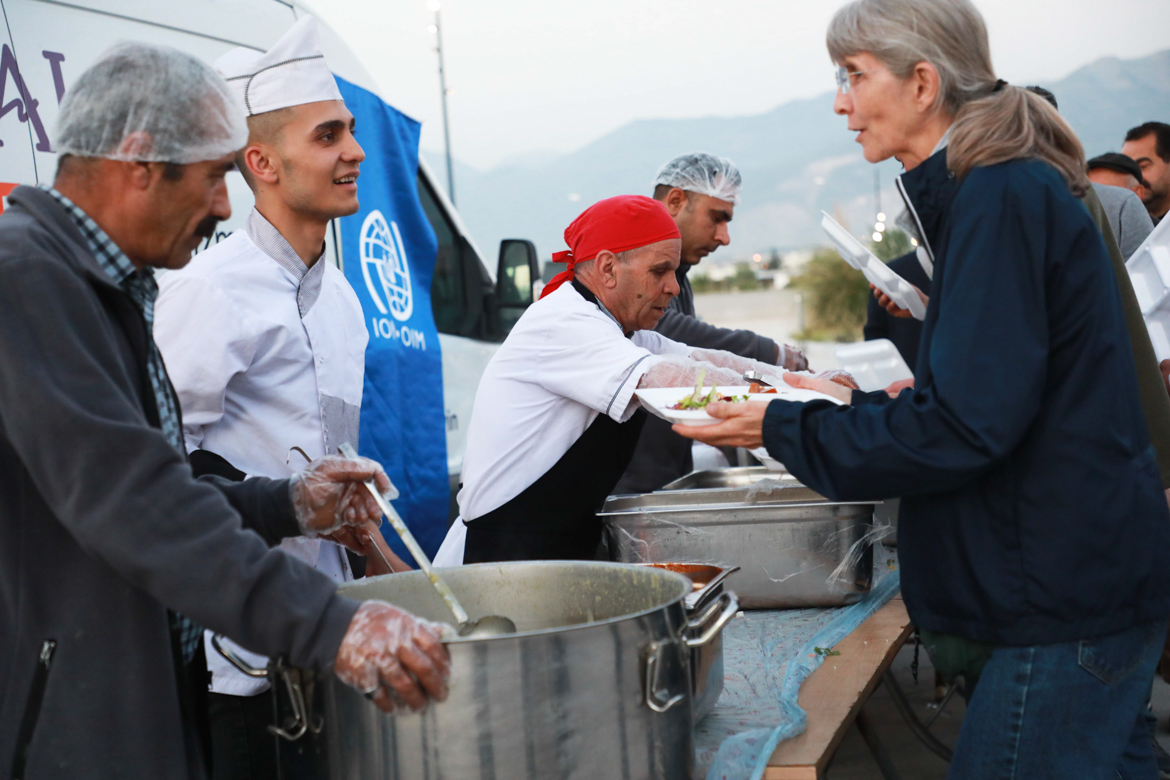Hatay, 24 April 2023 – Eid, or Ramazan Bayrami as it is called in Türkiye, marks the end of the Muslim holy month of Ramadan. Families and communities come together to celebrate the completion of month-long, sunrise-to-sunset fasting.
This year, however, the celebrations will be different, tinged by great sadness.
In February, earthquakes hit Türkiye’s southeast region and neighbouring Syria, levelling towns and cities, destroying thousands of homes and businesses, and displacing millions of people. It is during this devastating disaster that people – those directly affected and others around the country and the world – showed unprecedented support to help those living in the earthquake zone. With millions still living in temporary settlements, Iftar, a fast-breaking evening meal during Ramadan, has been a time to bring communities torn apart by tragedy back together.


People receive their Iftar meal. Photo: IOM/Begüm Basaran
As the sun began to set a few evenings before Ramazan Bayrami, 600 people gathered for Iftar in Hatay, organized by the International Organization for Migration (IOM) in partnership with the local authorities. The sound of the ezan, or call to prayer, echoed through the air, signaling the end of the day’s fast. The aroma of freshly cooked soup and stewed meat with rice filled the air.
Cem, a 38-year-old man who lost his home in Iskenderun, Hatay province, attended the Iftar with his wife and two children.
“We were so alone. Those days were bad. But thank God, we are alive,” he said. “We are trying to recover, and it’s meaningful for us to come together and share the sorrow and joy, to talk about what we’ve been through.”

Cem, his family and other community members at Iftar in Hatay. Photo: IOM/Begüm Basaran
Semir and his wife Matiya live in a temporary settlement, as their house was severely damaged by the earthquake and is uninhabitable. They only managed to take some clothes and furniture with them.
“Being together with others makes me feel good, especially after the earthquake,” said Semir. “What we experienced affected our mental state. Coming here together with other people makes me feel confident. Seeing other people means life is going on,” he added.

Semir and his wife Matiya. Photo: IOM/Begüm Basaran
The tables were full of food and the people enjoyed the dinner served to them. Apart from the soup and stew, it also included a salad and semolina dessert, ayran (a Turkish yogurt-based drink) and water. Laughter could be heard as families came together to eat and chat, a relief after months of stress and struggle. The children were not forgotten, and a clown show was put on for their entertainment, allowing the adults a break. Many families are still living in tents, containers and other one-room shelters.

Aleyna and her mother enjoy Iftar. Photo: IOM/Begum Basaran
“I hadn’t experienced an earthquake before. I think I just froze in that moment,” said 25-year-old teacher Aleyna. She is engaged and was planning her wedding before the earthquake interrupted her plans. Aleyna and her family first stayed at her fiancé’s home before moving to a tent in a temporary settlement.
“Before the earthquake, I think we took everything for granted. I never thought I would miss simple things like a toilet and shower.”
Speaking about the importance of the group Iftar, she said, “I see we are not alone. People think about us, and they are doing something for us. It’s nice to come together for Iftar, as being alone doesn’t feel right.” She will soon return to work as a teacher, as her technical high school in Iskenderun will reopen after Ramazan Bayrami.
As the night wore on, people began to share their experiences of the earthquakes. They spoke of fear and uncertainty, but also of acts of kindness and bravery that had emerged in the aftermath. They shared their gratitude for the support they had received from each other, and for the strength and resilience of their community.

Zehra and her son at the Iftar dinner in Hatay. Photo: IOM/Begüm Basaran
“Emotionally, we are not doing well,” said Zehra, a Syrian widow who lost her husband in the earthquake and is left to care for their eight-year-old son alone.
Their survival was nothing short of miraculous. Prior to the earthquake, she had visited her brother’s family and as it was late, he insisted that she stay overnight. Zehra’s own house did not withstand the first earthquake, and she lost her husband, all her belongings, and her documents in the devastation. After staying with her brother’s family for a while, she moved to a temporary settlement. This has made her life challenging, as her son is currently unable to attend school.
The importance of getting out and sharing Iftar with others was not lost on Zehra. “We feel better being here together with other people. It’s also about changing the scene and environment as we are in a tent all the time. We are also socializing here.”
This Iftar was organized by IOM in cooperation with the Hatay Metropolitan Municipality. In total, jointly with its national partners, IOM organized 35 Iftars of this kind for the communities in 9 cities all over Türkiye, reuniting more than 7,000 people. The events were organized with the financial support of the United States Government and the Central Emergency Response Fund.
This story was written by Begüm Basaran and Olga Borzenkova from IOM Türkiye.



